- Classical Full Face Lift
- HERSHE
- Since 1992, HERSHE has continuously strive to research for your youth & beauty

-
Powerful, Confident Lifts
by Expert Surgeons -
HER
SHE
-
Classical Full Face Lift
A surgery to improve wrinkles and sagging throughout the face.
The incision is made from the front of the hairline to the back of the ear, ensuring that delicate tissues like nerves and blood vessels are not damaged.
The SMAS layer is carefully lifted, causing the surrounding tissues to lift as well. The scope of surgery is usually wide, starting around the temple and extending to the neck. -
- Surgery Time
3 ~ 4 hours - Pain Level
Low - Recovery Period
7-10 days after Surgery - Anesthetic Method
Sedation - Duration
Almost Permanent
May vary by individual
The actual procedure and outcome of the surgery may vary depending on the individual. Side effects such as hematoma, edema, and infection may occur. - Surgery Time
- Who Is The Ideal Candidate For Classical Full Face Lift?
-
The aging process of the face is diverse and extensive.
Full facelift surgery addresses aging signs from the face to the neck with sufficient detachment.
The surgery targets thick forehead wrinkles, wrinkles around the eyes, drooping eyes, sagging cheekbones and cheeks, deep nasolabial folds, wrinkles around the mouth, a drooping chin, and sagging neck skin.
Full face lift surgery is recommended to achieve near-permanent results in reversing facial aging.
-
 Thread Lifting: 20s~Minimal invasive lifting
Thread Lifting: 20s~Minimal invasive lifting
procedure that effectively
repositions sagging skin of mild
degree to restore a youthful
appearance. -
 MACS Lifting: 40s~60sSurgical lift with minimal
MACS Lifting: 40s~60sSurgical lift with minimal
incision focused on restoring
aging signs primarily in the
mid-lower face, minimizing
the surgery scar and
downtime. -
 Full Face Lifting: 60s~An extensive facelift surgery
Full Face Lifting: 60s~An extensive facelift surgery
performed when sagging and
wrinkles are present across
the entire face and neck in
medium to severe degrees.

-
WHY
HERSHE -
Double Lift, Double Locking Method
Full Face Lifting that Directly Lifts the SMAS Layer
 Full Face Lifting Know-How
Full Face Lifting Know-How-
Full face lifting is an effective surgical procedure that addresses a wide range of aging signs. However, its effects on the area under the eyes and the center of the face may be less pronounced compared to those achieved with mid-face lifting surgery.
At HERSHE Plastic Surgery, we assess individual aging symptoms based on our extensive anatomical knowledge and surgical experience. If needed, we will develop a customized surgical plan that includes improving the mid-face area through an incision under the eyes. - How HERSHE Performs Classical Full Face Lift

 SMAS Layer Detachment Technique
SMAS Layer Detachment Technique
-
Facial wrinkles result not only from changes in the skin tissue but also from the development of wrinkles in the muscle layer, which leads to sagging.
To achieve comprehensive rejuvenation, it is essential to address both the wrinkles and sagging in the muscle layer through lifting.
A critical step in this process is the peeling procedure, which separates the skin tissue from the SMAS layer. This peeling must be performed meticulously to minimize the risk of damaging the facial nerve during surgery.
Additionally, preserving and repositioning the sagging fat due to aging can create a more balanced and three-dimensional lifting effect. Protecting these fat compartments from damage during the peeling process is equally important. Therefore, successful facial rejuvenation relies on precise and uniform peeling along the SMAS layer, which requires the expertise and skill of experienced medical professionals. - How HERSHE Performs Classical Full Face Lift
-
 Design the surgery meticulously to ensure a smooth suture line.
Design the surgery meticulously to ensure a smooth suture line. -
 Detach the sagging skin layers from the SMAS layer.
Detach the sagging skin layers from the SMAS layer. -
 Lift the SMAS layer using the “Ssamzie Technique,” which causes the upper skin layers to be elevated.
Lift the SMAS layer using the “Ssamzie Technique,” which causes the upper skin layers to be elevated. -
 Resect the sagging skin layers and apply double sutures both inside and outside the incision line.
Resect the sagging skin layers and apply double sutures both inside and outside the incision line.
 Double Lift, Double Locking Method
Double Lift, Double Locking Method
-

-
- A step to secure the layer and ensure that the lifting results are properly maintained.
-
By lifting and securing the SMAS layer upwards, a comprehensive facelift of the lower face can be achieved.
The special thread Epiticon®, designed and developed by Dr. Jung Young Choon, Head Surgeon of HERSHE Plastic Surgery, will be used to secure and further pull the tissue. The double-locking method used ensures that the facial tissue is firmly anchored from the top.
Epiticon® represents a next-generation suture thread developed specifically for pulling and fixing tissues. It is extensively utilized in a variety of procedures, including face lifts, chest lifts, and butt lifts.
-
Epiticon®, used in the Classical Full Face Lift,
features bidirectional cogs at each protrusion, making it ideal for lifting sagging tissues upwards or gathering and securing them in the desired position. -

- Thesis Announcement in a World-Renowned International Journal
- On the Subject of Thread Lifting Using Polydioxanone (PDO) Threads

- 2022.05
- International Congress of Minimally Invasive Surgery
- Lecture Session on the Release of Springer Textbook
- 2022.03
- JETEMA Webinar
- Presentation on the Subject: Buttock Lift


- 2021.05
- Dermatologic Surgery
- Thesis Announcement on the Subject: Gluteal Soft Tissue Repositioning Using Polydioxanone (PDO) Threads
- 2020.11
- Korean Congress of Plastic Surgeons
- Un-Tact Presentation


- 2020.10
- Minimally Invasive Plastic Surgery Research Association
- Participation in Web Symposium
- 2019.11
- KRPS Conference: Epiticon®
- Presentation on Thread Lifting

- AFTER CARE
-
HERSHE Full Face Lift is an incisional facelift surgery, precautions prior to the return to daily life after the surgery are particularly important.
Double suture method that tightly seals the in and out of the skin assisting the incision scars heal quickly.
The incision scars gradually fade over time, and can be covered with makeup or BB cream.
Though there may be differences in the degree of healing depending on the individual, HERSHE Plastic surgery Korea offers personalized postoperative care programs which may assist with faster recovery.

- HEALITE® Laser Treatment After Surgery
-
1. The 590nm wavelength of low-level micropower is initially applied to the epidermal layer of the skin to ensure optimal delivery of healing wavelengths, followed by the 830nm near-infrared wavelength, known for its deep penetration and strong healing capabilities.
2. The 830nm healing photons are emitted from 1,800 light sources, creating a zone where the photons overlap.
3. This zone exhibits healing effects and facilitates rapid skin regeneration and pain relief by ensuring sufficient photon delivery to deeper layers of the skin.
-
 The combination of pre-irradiation with low-level micropower at 590nm, followed by the powerful 830nm near-infrared (near-IR) wavelength that penetrates deep into the skin, is the technique used in HEALITE® phototherapy.
The combination of pre-irradiation with low-level micropower at 590nm, followed by the powerful 830nm near-infrared (near-IR) wavelength that penetrates deep into the skin, is the technique used in HEALITE® phototherapy. -
 The LEDs on the panel are precisely arranged to ensure that the emitted light from each LED overlaps, allowing for interactions through a large number of photons.
The LEDs on the panel are precisely arranged to ensure that the emitted light from each LED overlaps, allowing for interactions through a large number of photons.
- Intensive Scar Care Program
-
HERSHE Plastic Surgery Korea offers an intensive scar care program that is tailored based
on the surgeon's diagnosis, depending on the degree of the postoperative scars.
-
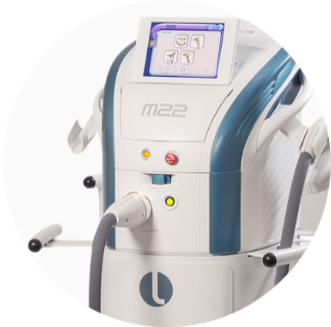 M22® Fractional Laser Treatment
M22® Fractional Laser Treatment -
 Picosure®
Picosure®



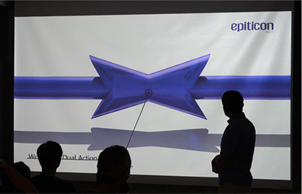
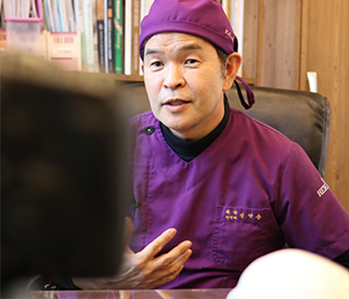



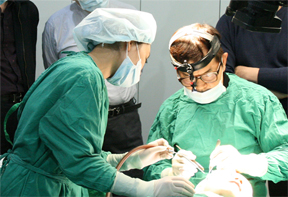
- Professional
- Reason to be confident in anti-aging
-
Since 1992
HERSHE Plastic Surgery Korea is committed to provide natural and satisfactory outcome
through continuous research and study about minimal invasive anti-aging.
HERSHE thoroughly analyzes your personal aging symptoms and lifestyle
to offer the most optimal anti-aging solutions bespoke to your individual needs
based on extensive effort and experiences since 1992.
-
Surgical facelift
by Dr. Jung Young Choon
- Personalized
- Bespoke anti-aging tailored to perfection
-
Aging manifests differently in each person, necessitating a detailed plan that addresses individual aging concerns.
HERSHE Plastic Surgery Korea offers a comprehensive anti-aging solutions from surgical and non-surgical anti-aging solutions, from facelifts to non-surgical lifting procedures suggested by anti-aging specialists.
Based on the extensive clinical experience and continuous research of our anti-aging experts, HERSHE is committed to deliver personalized anti-aging solutions bespoke to each individual's aging stage. -
Lifting Program by
individual aging stage From non-surgical lifting
to full facelift surgery Bespoke anti-aging guidance
by lifting planner
- FAQ
- Frequently Asked Questions
Q.How long will the results last?
A. Full facelift surgery is generally considered to be long-lasting and almost permanent.
However, it's important to note that aging can continue to affect the skin, muscles, and tissues over time. To maintain the results, it is recommended to practice good skincare and make lifestyle improvements to slow down the aging process.
Q.Will there be significant scarring?
A. Full facelift surgery may involve longer incision lines due to the nature of the lift and repositioning of underlying tissues.
The incisions are usually well-hidden and will fade over time. Laser treatments and scar management techniques can also help minimize the appearance of scars.
Q.Are there any potential side effects or risks associated with this procedure?
A. Like any surgical procedure, there may be unexpected discomfort or side effects.
To minimize potential side effects, it is crucial to consult with an experienced and qualified specialist before deciding on the surgery.
Following post-operative instructions and proper care is also essential in managing any discomfort or potential side effects.
If you experience significant discomfort, excessive bleeding, heat sensation, inflammation, or any other concerning symptoms, it is essential to contact the hospital promptly to receive appropriate medical attention.
Full facelift surgery involves delicate manipulation of facial tissues, and if not performed correctly, it may lead to unnatural facial expressions or other complications. Therefore, it is crucial to seek a surgeon with extensive anatomical knowledge and experience in performing the procedures.
Q.Will it be very painful?
A. The procedure is performed under anesthesia, so there should be no pain during the surgery.
Some discomfort may be experienced in the initial recovery period, but it should subside within a few days.
Q.When can I return to my daily activities?
A. You can start washing your face the day after the surgery, avoiding the area where the tape is applied.
You can use a moist towel to gently clean your face.
You can wash your hair from the third day, but be cautious not to let water get into the surgical area; you may need someone's assistance.
After 7 to 10 days, the stitches can be removed, and any discomfort when opening your mouth will usually improve within a couple of weeks.
Q.Are there any surgeries or procedures that pair well with Classical Full Face Lift?
A. Full facelift surgery aims to restore the position of sagging tissues and skin caused by aging.
To maximize the lifting effect, it is often beneficial to combine full facelift surgery with other procedures that enhance the three-dimensional contours of the face.
One common option is to perform fat grafting or liposuction in specific facial areas, which helps to create a more youthful and beautiful facial shape.
Additionally, correcting wrinkles and sagging in other highly aged areas such as the eyes, under eyes, eyelids, lips, and areas around the mouth, can contribute to an overall anti-aging effect.
Q.What are the precautions after surgery?
A. After the surgery, there may be minor bleeding or hematoma formation from even small impacts between 1 to 3 days post-surgery.
Don't be worried, you can gently apply clean gauze or tissue to the affected area for about 3 minutes to stop the bleeding.
Be cautious not to let water get into the surgical area, and avoid chewing on hard or tough foods.
It's best to refrain from opening your mouth too wide until you have fully recovered.
Also, avoid bending your head forward for an extended period, and for at least 3 to 5 days, try to sleep with your head elevated higher than your heart.
Furthermore, it's recommended to refrain from drinking alcohol and smoking for about a month after the surgery.

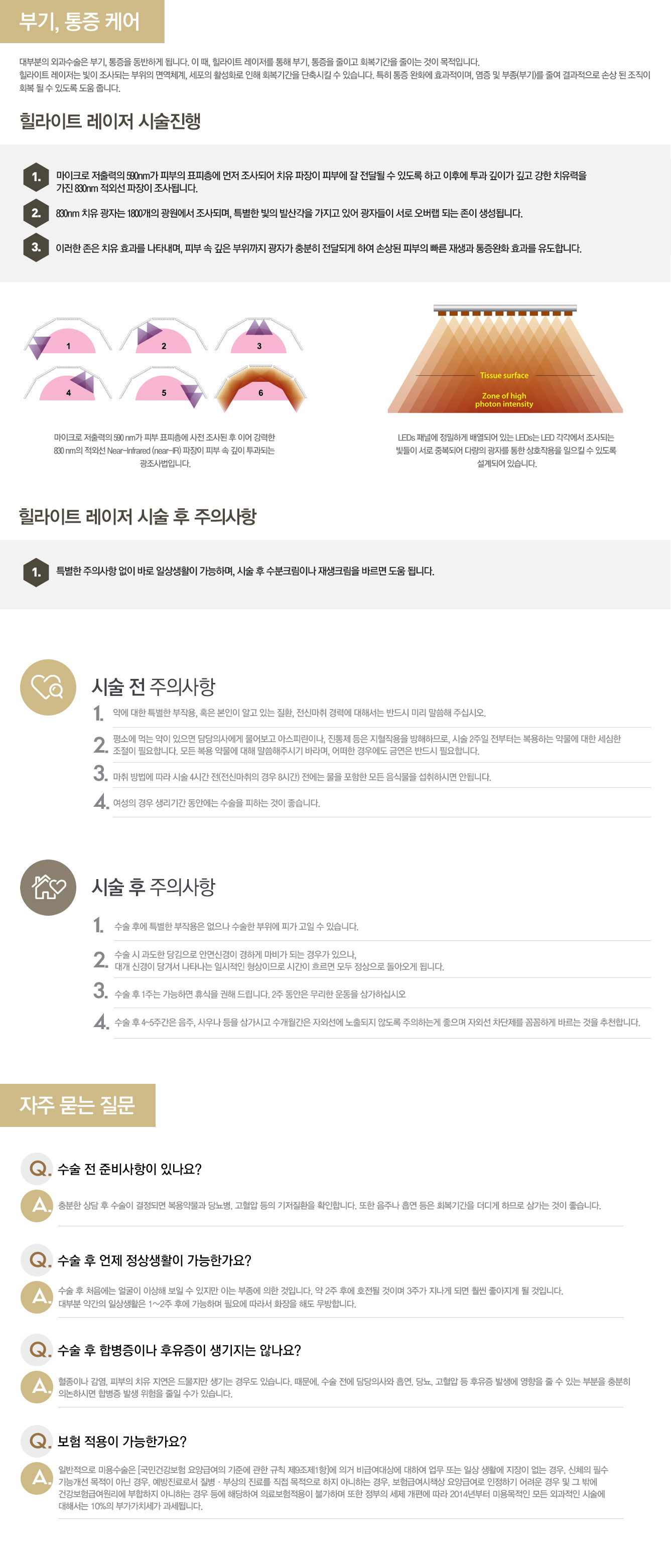
-
HER
SHE - We Prioritize Your Satisfaction!
- Since 1992



- 허쉬성형외과 전문의 의료진이 콕콕 짚어드립니다.
-

 힙업리프팅으로 애플힙 뒤태 만들수있나요? 힙업성형 Q&A
힙업리프팅으로 애플힙 뒤태 만들수있나요? 힙업성형 Q&A
-

 어깨필러 상담부터 시술과정까지, 직각어깨 REAL 현장
어깨필러 상담부터 시술과정까지, 직각어깨 REAL 현장

 쌍수하고 술 언제부터 마셔도 되나요?
쌍수하고 술 언제부터 마셔도 되나요?

- Before After
- 만족스러운 Full facelift 다음은 당신입니다.



-
1
허쉬는 대리수술이 없습니다.
진료를 담당한 의사가 직접 수술하는 것은 당연합니다. -
2
무리한 수술을 권유하지 않습니다.
디테일한 상담, 명확한 진단으로 가능한 범위 내에서
진료를 하겠습니다. -
3
끊임없는 연구와 노력을 이어갑니다.
기본부터 지키며, 성형을 발전시키는데
이바지하겠습니다. -
4
환자와 공감하고 소통하는 병원
작은 목소리도 가족이나 친구처럼 소홀히 하지 않습니다.















